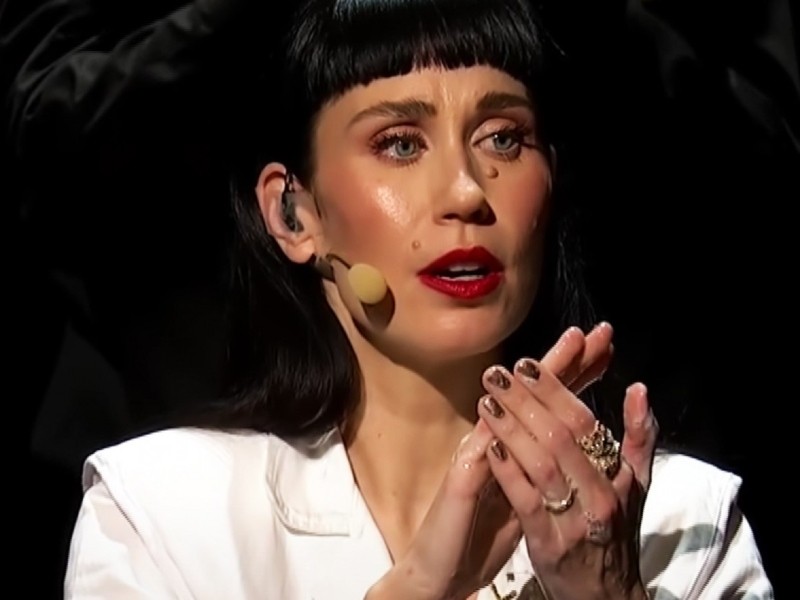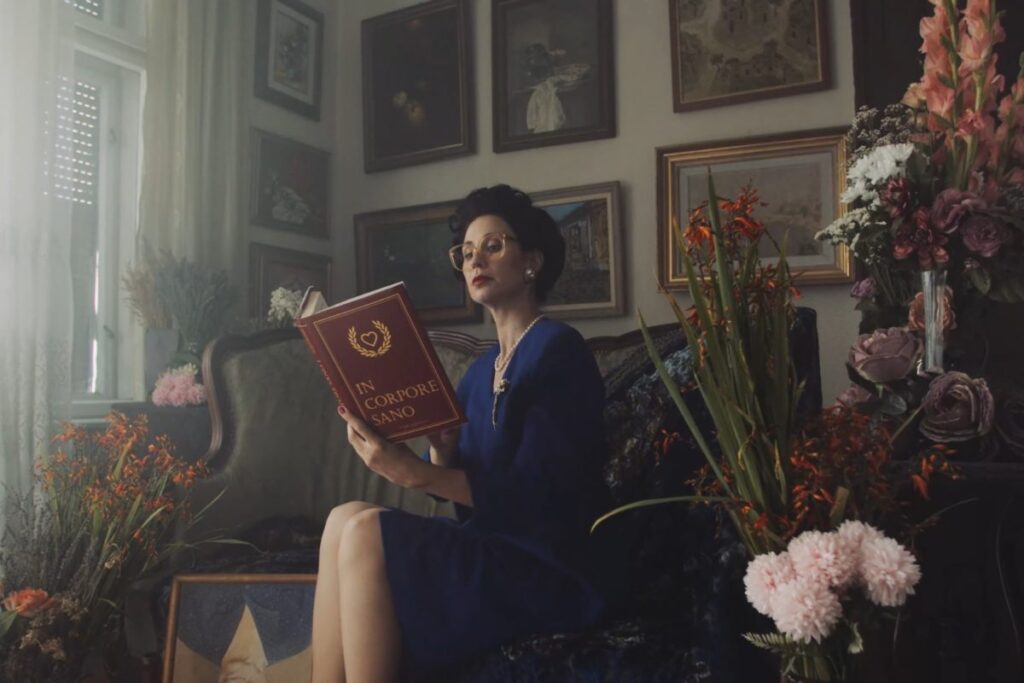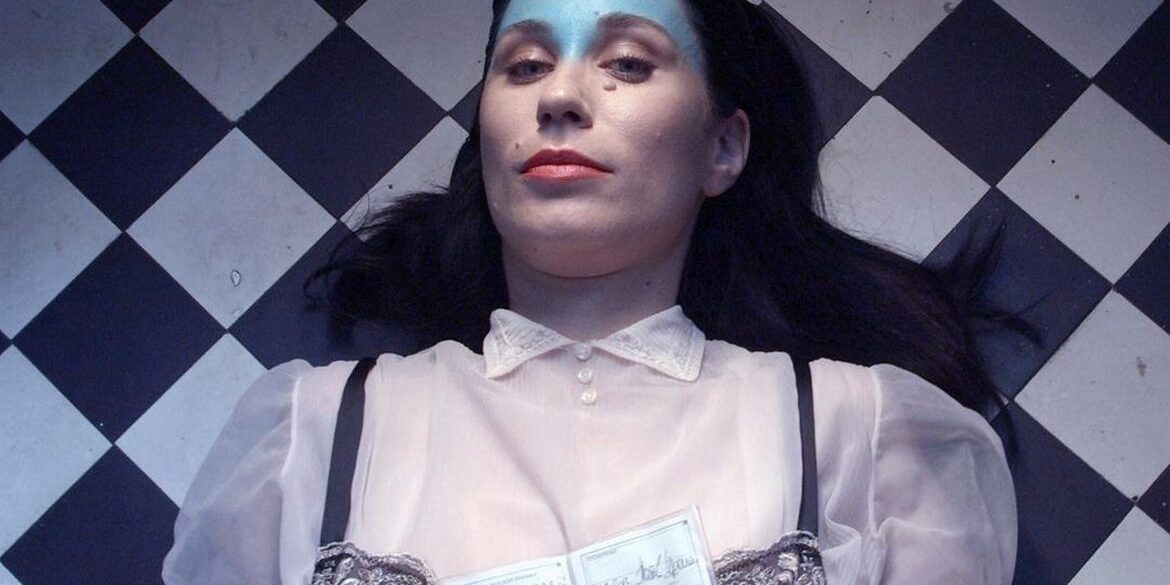Duška Radosavljević Krojer discusses Konstrakta, the Serbian pop phenomenon and unlikely Eurovision contender, through the medium of the YouTube reaction video.
Less than a week away from the Eurovision Song Contest, Serbia already has a winner – from a purely paradigm-shifting, boundary-busting, phenomenon-creating point of view, and totally irrespective of the ultimate outcome of the competition. I am aware this sounds hyperbolic, especially to those unfamiliar with Konstrakta aka Ana Djurić’s ironic conceptual pop. But bear with me.
In purely objective terms, it is notable that Konstrakta’s In corpore sano was a wildcard even in Serbia where it defied the bookies’ predictions and the already favourable jury vote to win the pre-Eurovision contest with a record-breaking number of popular votes. Then, it took the internet by storm – the semi-final performance broadcast on Serbian RTS on 4th March had over two million views in just a couple of days, and has so far been viewed about 14 million times.
The consensus is this: there has been nothing like it at the Eurovision Song Contest before. Konstrakta’s work is a far cry from the traditional Eurovision staple of perfect harmonies, heart-rending power ballads, or spectacular scenography and glitzy dance routines. But it is also nowhere near the eccentricity of the previous attention seekers mining the outer reaches of ethno folk or hard rock in a bid for originality. No, the only local tradition this work most explicitly evokes is the tradition of performance art as spawned by the Serbian artist Marina Abramović, who has herself long ago gone mainstream by featuring in Sex and the City and duetting with Jay Z and Lady Gaga.
That said, Konstrakta’s work is not derivative, and while I have characterised it as ‘ironic’ above, it does not in fact parody any of the cultural references it evokes. It simply positions itself within an intertextual network of cultural material which includes her own studies of architecture (hence, the moniker), the musical influences of hip hop, jazz and Yugoslav rock,[1] as well as glossy magazines and a healthy dose of comic incongruity (her songs poeticise the autonomic nervous system, the prosaicness of everyday life, self-seeking fantasies about being a bird who brings luck by flying around the world and shitting on people and things). Most interestingly, the Artist (capital A), is unusually non-judgmental and unpretentious; she had entered the Serbian competition only for a little bit of publicity for her newly forged solo career (after decades of working with the band Zemlja gruva – The Land of Groove) and without any expectation of a triumph.
Then there is the unconventional subject matter of the competing pop song: physical and mental health. Springboarding from the famous Latin dictum (well, seemingly more famous in Serbia than elsewhere) that healthy body is the precondition of the healthy mind, the artist problematises this claim by reference to: 1) unrealistic health and beauty standards of women’s magazines, 2) social inequality (what about those, such as Serbian freelance artists, who do not have health insurance?), and also, 3) by topical reference to the Covid-19 pandemic. The theatrical staging and costume invokes a fusion of a religious ritual (having to rely on God in the absence of health insurance) and a hospital worker washing her hands continuously for nearly three minutes (durational performance?, hygiene?, Lady Macbeth?, relinquishing of responsibility?). The semantic layering opens up space for endless readings: performative, cultural and musicological, and this multiplicity is also the main source of this number’s artistic value, in my view.
Certainly, there is no easy or entirely fair way to summarise the Serbian representative, other than to say that the power of this performance is almost entirely in the experience of its reception, and therefore completely individual, inflected and impossible to reliably predict in the international context of Eurovision. In the two months since Konstrakta’s unexpected emergence as the winner of the Serbian song competition, I have become obsessed not only with the artist’s entire oeuvre and the endlessly stimulating critical analyses of her work in the post-Yugoslav region,[2] but also with the previously unfamiliar to me genre of Youtube reaction video.

Konstraka performing In Corpore Sano
Here I have discovered a whole world of Eurovision buffs with expert analytical skills such as Irish Tom who lives in Shanghai or the more serious outfits such as the Wiwibloggs, both of whose reactions to In corpore sano display a symptomatic mixture of bafflement converted to enthusiasm mixed with anxiety around the language barrier due to the song being sung in Latin and Serbian. Then there are the honest reactions of sensitive, curious, open minded souls such as Victor, and BVRT, who gets my own top scores for actually going off to research Marina Abramović’s ‘Art Must Be Beautiful, Artist Must Be Beautiful’ as a result of listening to this song. I have also enjoyed seeing how Konstrakta crosses the cultural and geographical boundaries eliciting deep and quiet musical appreciation from Afrosys or from Muzammil VagoZz who has reacted to almost every Konstrakta video released since 4th March.
Counterbalancing incredulous, tea-spitting reactions to the song’s mention of Meghan Markle are the particularly interesting responses from those corners of the world where the Duchess of Sussex is not a household name (see Liam’s Mum and Gracie Wandyte). However, my personal favourites are the musical analyses, which take absolutely no notice of the meaning of the lyrics, such as the Portuguese heavy metal singer Reação Imediata as well as the self-confessed ‘lyrically inept’ analysis from MTR. These analyses also highlight the syncopation patterns and the conversational form of the song (held against Konstrakta by some in Serbia) as its distinguishing value; and I would argue this is completely in sync with Serbia’s own heritage of sung poetry, repurposed as ecriture feminine for the 21st century.
I have gazed at these videos, not unlike Konstrakta’s grandma Desanka, ‘reading the fortune from animal livers’, though I cannot claim I can tell how this will turn out on 14th May. The only optimistic conclusion I have drawn is that Serbian need not be a barrier in appreciating Konstrakta’s work, as shown by the Kenyan DJ Edygrim who appears to have actually learnt the lyrics of the song in just under a month.
Possibly also inspired by Konstrakta, I am much more interested in my own response to these things. Somewhat nostalgically, as I study the dramatic transformations on the faces of these randomly selected listeners, I try and recall my own first reaction to In corpore sano. I try to imagine I am seeing/hearing it for the first time in an attempt to reconstruct and retrace how and why exactly I became so obsessed with it: is it the way she stares into the camera, is it the dynamic camera angles, the unusually static staging, or is it the lyrics? The dramatic delivery of the opening line drawn from a glossy magazine pondering ‘the secret of Meghan Markle’s healthy hair’, the poeticisation of the viscera, the ‘I have no health insurance’ climax followed by the touchingly innocent ‘and how will they follow me’, or the mysterious choric crescendo in Latin at the song’s finale, which sends me right back to pressing play again?

The video of Konstrakta’s Nobl
Konstrakta is my absolute winner because the last time a musical act left such a strong impression on me was in my adolescence when I was just discovering the power of music to express my personal experience. I have now heard In corpore sano so many times that it quietly echoes somewhere in between my own internal organs as I cook, shower, go to sleep – although full disclosure, my favourite of Konstrakta’s songs is actually Neam šamana (‘I’ve got no shaman’) – the one that goes ‘who am I, fuck it, when I’ve got no shaman’; which actually shares the no.1 spot with ‘Nobl’ (‘Noble’) the one about those of us who still remember the Socialist Federal Republic of Yugoslavia now facing up to the horrors of midlife crisis… I mean, I don’t know, I can’t really make up my mind – I have just been blown away by the acoustic version of ‘Mekano’ (‘Soft’) newly arranged for the Eurovision House Party, the song about how neoliberalism takes away your individuality, your personal ‘shadow in the moonlight’… Maybe all five of Konstrakta’s songs are my number one?
And I know I am not the only one who has them on repeat 24/7. One thing is certain: there is only one way out of the magic Konstrakta loop we are all caught up in – let’s hope this is all over as soon as possible so she can be free to go and write some more.
[1] For me the use of the red neon cross in the projections is not only evocative of medical emergency but also of Laibach’s red cross logo; while the eating of the chicken wings in the framing of the Triptih version of the song evokes the line ‘Ručali smo meso, glodali smo kosti dobrih životinja’ (‘We lunched on meat, we gnawed on the bones of good-natured animals’) from ‘Kao da je bilo nekad’ by Ekatarina Velika.
[2] If you cannot read Serbian, I do recommend running some of these texts through Google Translate: Zoran Stajčić’s reflection on ‘Triptih’, ‘a three-part a series about vegetating in the matrix of mid-life’, which also contains ‘In corpore sano’; Ksenija Stevanović’s musicological analysis; Miljenko Jergović’s reading of the song against the backdrop of the Russia-Ukraine war and my favourite Mima Simić’s witty and incisive piece ‘Postbalkan baroque and the Eurovision renaissance’
Duška Radosavljević Krojer is a writer, dramaturg and academic. She is the author of award-winning academic monograph Theatre-Making: Interplay Between Text and Performance in the 21st Century (2013) and editor of Theatre Criticism: Changing Landscapes (2016) and the Contemporary Ensemble: Interviews with Theatre-Makers (2013). Her work has been funded by the Arts and Humanities Research Council in the UK multiple times including for www.auralia.space (2020-21) and The Mums and Babies Ensemble (2015). She is a regular contributor to The Stage, Exeunt and The Theatre Times.








